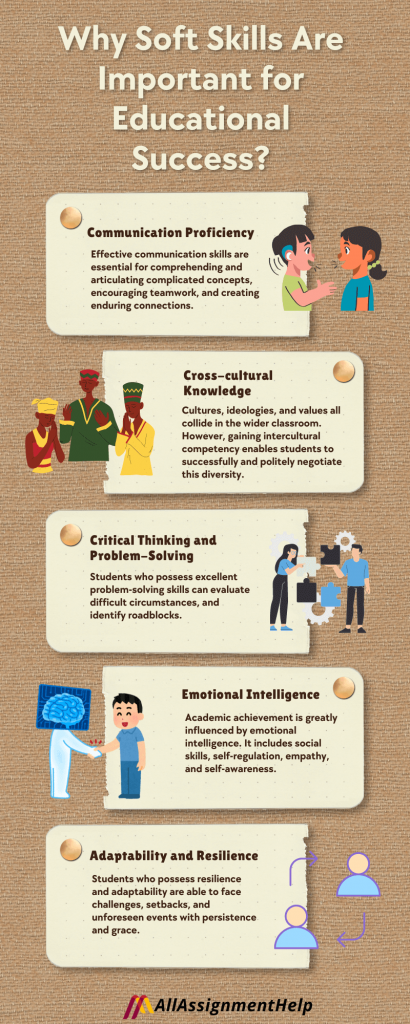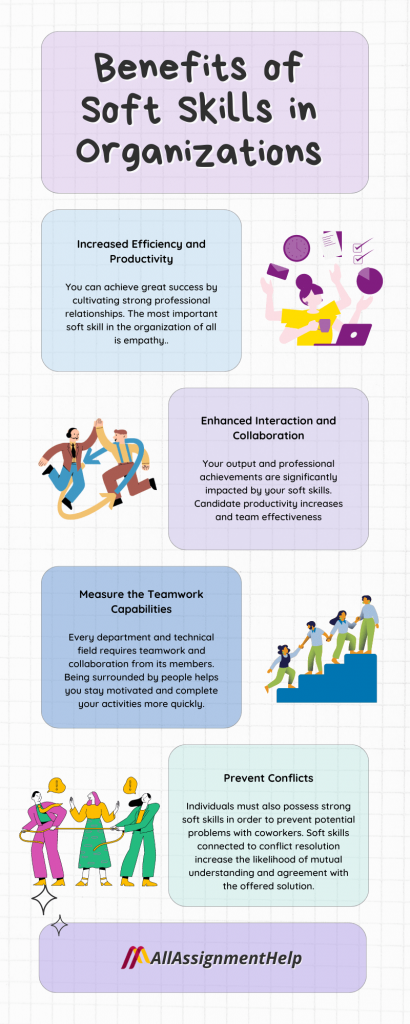Table of Contents
The term “soft skills” refers to both personal qualities and interpersonal skills that affect an individual’s ability to collaborate or interact with others. It includes a set of skills such as delegation, empathy, time management, and teamwork. Soft skills were once thought to be just that—soft. That is, they were considered to be less significant than hard skills. However, over the past few years, that perception has been changing. Now, these skills are just not limited to a few areas but they are important in education and organizations as well.
Soft skills are essential in education and the workplace. They are becoming more and more important in determining the success of an individual in both their personal and professional lives. In this blog of All Assignment Help, we will make you familiar with why such skills are essential to educational and organizational success.
List of Soft Skills and Examples
Here are some crucial soft skill examples and how they might improve your performance:
Communication
Effective communication is the capacity to express and convey thoughts and emotions. It is one of the most important soft skills in the education and organization sector.
Examples of communication skills include:
- Verbal communication
- Written communication
- Presentation
- Constructive feedback
- Active listening
Problem-Solving
Any profession will benefit from having the ability to address challenges both creatively and analytically. Ultimately, there isn’t a career in the world that guarantees you won’t encounter difficulties. Therefore, there is always a need for innovative problem solvers.
Examples of problem-solving skills include:
- Analysis
- Logical reasoning
- Observation
- Brainstorming
- Decision making
Teamwork
Teamwork will always be a vital soft skill. It facilitates task completion and productive group work.
Examples of skills related to teamwork include:
- Resolution and management of conflicts
- Working together
- Coordination
- Concept sharing
- Settlement
Creativity
It actually encompasses a wide range of subskills, from inquiring to experimenting. Therefore, the creative skills of artists can be applied just as much to any professional.
Here are a few examples of creative skills:
- Imagination
- Mind-mapping
- Innovation
- Experimentation
- Questioning
Interpersonal Skills
Being able to build relationships, engage with people, and leave a great impression on those around you are all aspects of interpersonal skills.
Examples of Interpersonal Skills include:
- Empathy
- Humor
- Networking
- Tolerance
- Diplomacy
Effective communication, teamwork, and flexibility in a dynamic work environment all depend on soft skills. They improve general well-being, career advancement, and personal development.
Read Here: Need for Effective Communication Skills in Today’s World
Why Soft Skills Are Important for Educational Success?
There is a common misperception in educational circles that mastery of hard skills that are taught in regular classrooms is the only path to success. However, the face of education is changing as more people realize how important soft skills are in determining one’s academic path.
Below listed the importance of soft skills in education:

Communication Proficiency
Good communication is essential in a multicultural classroom. When students from various language and cultural backgrounds get together, they add a variety of viewpoints to the discussion. Effective communication skills are essential for comprehending and articulating complicated concepts, encouraging teamwork, and creating enduring connections. Good communication skills are essential for group tasks, conversations, and concept presentations. It also promotes networking and collaboration with others.
Cross-cultural Knowledge
Cultures, ideologies, and values all collide in the wider classroom. However, gaining intercultural competency enables students to successfully and politely negotiate this diversity. Furthermore, understanding modest cultural differences, exhibiting understanding, and collaborating peacefully with people of other origins are all necessary. Cross-cultural competency is a highly valued skill that transcends the classroom and is applicable in the international workforce in a world that embraces diversity.
Critical Thinking and Problem-Solving
The capacity to solve problems and think critically is usually an essential requirement for success in education. Students who possess excellent problem-solving skills are able to evaluate difficult circumstances, identify roadblocks, and come up with original solutions. Similarly, students who possess good critical thinking skills are able to assess data, reach logical conclusions, and make wise decisions. Additionally, they should also possess these soft skills to succeed in online educational settings when taking online classes. Otherwise, they might end up hiring an online class helper for assistance with their online classes or coursework.
Emotional Intelligence
Emotional intelligence is the capacity to control your own emotions as well as those who are in the area around you. Academic achievement is greatly influenced by emotional intelligence. It includes social skills, self-regulation, empathy, and self-awareness. Students who possess strong emotional intelligence are able to control their emotions, handle stress, connect with others, and form healthy relationships with others. They are more capable of managing the demands of the classroom, managing social situations, and working well with classmates and teachers.
Adaptability and Resilience
Students who possess this skill are more equipped to deal with unforeseen obstacles, welcome fresh ideas, and adapt to various learning settings. The academic environment is always changing, bringing with it fresh opportunities and difficulties. Students who possess resilience and adaptability are able to face challenges, setbacks, and unforeseen events with persistence and grace. They continue to be adaptable, versatile, and eager to take lessons from both achievements and setbacks. Moreover, it will eventually improve their academic standing.
Benefits of Soft Skills in Organizations
Soft skills are necessary for most interactions with other people. Within an organization, you can be pitching your concept to coworkers, networking to find a new position, negotiating to secure a new contract, and so forth. We utilize soft skills on a daily basis in the workplace. Moreover, developing these skills will help you advance your career and gain more business.
Here is how soft skills are beneficial for organizations:

Increased Efficiency and Productivity
You can achieve great success by cultivating strong professional relationships. Good communication at work has a significant impact on how individuals relate to the organization and the values they offer, whether they are team members, shareholders, clients, or business partners. The most important soft skill in the organization of all is empathy. It increases efficiency and productivity as well as creates long-lasting partnerships at work.
Enhanced Interaction and Collaboration
Your output and professional achievements are significantly impacted by your soft skills. Candidate productivity increases and team effectiveness is improved when there is effective communication at work. The majority of recruiters look at a candidate’s diversity of soft skills because having knowledge in a variety of fields benefits the firm. Communication is crucial in the workplace. Also, employers want to give recruiters advance notice and appreciate it when they do.
Measure the Teamwork Capabilities
Every department and technical field requires teamwork and collaboration from its members. Being surrounded by people helps you stay motivated and complete your activities more quickly. Employers usually seek out applicants who mix well with the corporate culture. This is calculated using your soft skills. However, some of the best soft skills to compute teamwork capabilities are empathy, teamwork, great communication, listening comprehension, and flexibility.
Prevent Conflicts
Individuals must also possess strong soft skills in order to prevent potential problems with coworkers. For instance, listening skills can assist you in identifying the underlying causes of disagreements and in developing thoughtful solutions. Both of them can help in problem-solving. Similarly, soft skills connected to conflict resolution including compromise, mediation, and negotiation increase the likelihood of mutual understanding and agreement with the offered solution.
Simplify Adaptability and Identify Limitations
Soft skills are useful in the workplace as they make it easier to respond to the evolving needs of the organization without having to struggle or manage outdated changes. It is possible to identify the weaknesses in the organizational workflow by evaluating soft skills. However, effective cooperation is characterized by mutual respect, shared decision-making, and active engagement. Check to see how well the team members can solve problems and identify even the smallest variations. It indicates a lack of soft skill skills if they are vulnerable to changes.
Top Online Soft Skill Courses and Certifications for All
Those who are interested in building soft skills can enroll themselves in the following online courses:
- Emotional Intelligence at Work – Coventry University
- How to Succeed at: Interviews – The University of Sheffield
- Essential Skills for Your Career Development – University of Leeds
- Wellbeing and Resilience at Work – University of Leeds
- Professional Resilience: Building Skills to Thrive at Work – Deakin University
- Overcoming Imposter Syndrome: Identify the Patterns Undermining Your Confidence – University of Southern Queensland
- Soft Skills for Navigating Global Challenges – Ubiquity University
- Project Planning and Communication: Mastering Gantt Charts and Stakeholder Management – Coventry University
- Creative Problem Solving: Design Thinking in Health and Social Care – St George’s, University of London
There are more such courses provided by universities around the world to develop your soft skills. These courses are made for all levels of individuals. However, if you feel that you are unprepared for the online exam or thinking about hiring someone to take your online exam for you for any reason, just reach out to us. We will connect you with an expert online exam helper who has extensive knowledge of your course and can take the exam on your behalf and make you pass with flying colors.
Also Read: What Are the Key Skills Employers Look for in Online Graduates?
Final Thoughts!
Soft skills are regarded as the most relevant human qualities that are necessary for promoting inclusiveness and successful communication in every sector whether it is educational or organizational. Additionally, soft skills are important for an organization’s overall performance because they create a good and productive work atmosphere. They have a growing significance in the job market and are essential to someone’s achievement in both their personal and professional life. Therefore, soft skill development must be given top priority in both the organization and education.
FAQs
| What is the significance of soft skills for students? Students who possess great communication, cooperation, and problem-solving skills are highly valued. These skills are essential for managing the demands of different businesses and occupations. |
| Why do individuals lack soft skills? Academic success is often given more weight in the educational system than the development of soft skills. This is a major disadvantage because soft skills are becoming more and more important for collaboration and efficient communication in the workplace. |
| Why are soft skills important? Soft skills can help you advance in your position and are crucial for enhancing your capacity to collaborate with others. Soft skills are beneficial for small business owners and independent contractors in attracting, acquiring, and keeping customers. |
